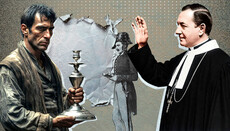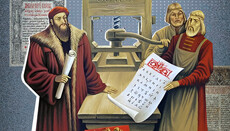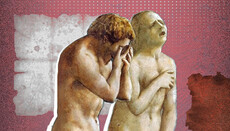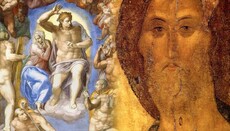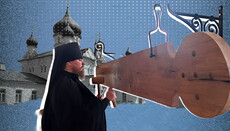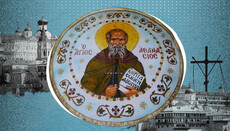“Picasso”: How to Read the Bible. Part 2

Excerpts from Andrey Vlasov’s book “Picasso. Part One: The Slave.” Episode 18.
Time: 1992
Place: Kyiv
Characters: Fr. Lavr, seminarians
“…Let’s continue. Secondly…”
“Thirdly,” someone corrected him.
“Thirdly,” said Fr. Lavr, “Scripture is a unified whole in both meaning and purpose – the purpose of conveying to us those truths essential for our salvation, so that we may live a God-pleasing life on earth and inherit the Kingdom of Heaven. On the other hand, the Bible is not a textbook in which everything is laid out neatly and systematically. It is the book of life, of history, of examples and facts. Therefore, to grasp the true teaching of Holy Scripture on any given subject, one must study all the places in the Bible where it is mentioned. Otherwise, our understanding will be distorted and erroneous.
“For example, take the most decisive event in the life of the world and of every person – the Last Judgment. The Gospel of Matthew gives us its most complete description.”
He closed his eyes and recited from memory:
“When the Son of Man shall come in His glory, and all the angels with Him, then He shall sit on the throne of His glory. Before Him shall be gathered all nations, and He shall separate them one from another, as a shepherd divides the sheep from the goats. The sheep He will place on His right hand, and the goats on the left. Then the King will say to those on His right hand: ‘Come, you blessed of My Father, inherit the Kingdom prepared for you from the foundation of the world. For I was hungry, and you gave Me food; I was thirsty, and you gave Me drink; I was a stranger, and you took Me in; I was naked, and you clothed Me; I was sick, and you visited Me; I was in prison, and you came to Me.’ Then the righteous will answer Him, saying: ‘Lord, when did we see You hungry and feed You? or thirsty and give You drink? When did we see You a stranger and take You in, or naked and clothe You? When did we see You sick or in prison and come to You?’ And the King shall answer and say to them, ‘Truly I tell you: inasmuch as you did it to one of the least of these My brethren, you did it to Me.’”
He fell silent, standing for a few moments with closed eyes.
“Father Lavr, do you really know the whole Bible by heart?”
The question went unanswered.
“So, brothers,” he continued, “if we take only this passage out of context, we might reach a completely wrong – and even spiritually deadly – conclusion: that we need neither faith, nor prayer, nor the Church, nor Communion, nor even the keeping of the commandments. We could steal, fornicate, get drunk – for here, apparently, the Lord doesn’t mention any of that at the Judgment! All that’s needed, it seems, is to clothe someone, feed someone, and visit the sick – and the gates of Heaven will be opened! That’s what this passage seems to say, doesn’t it?”
“But in reality,” he went on, “to understand what will truly happen at the Last Judgment, we must examine all the passages in Scripture that speak of it, directly or indirectly: ‘He that believes and is baptized shall be saved; but he that believes not shall be condemned’; and, ‘He that hears My word and believes Him who sent Me has eternal life and shall not come into judgment, but has passed from death into life’; and, ‘The fearful and unbelieving, the abominable and murderers, and fornicators and sorcerers and idolaters, and all liars shall have their part in the lake which burns with fire and brimstone,’ – and many others.”
“Many heresies,” he added, “arose precisely because people took one isolated verse, made it the cornerstone, and built an entire doctrine on it, ignoring everything else Scripture says. The heresy of Roman Catholicism, for example, grew from the words, ‘You are Peter, and on this rock I will build My Church, and the gates of hell shall not prevail against it’ – hence the false teaching about papal supremacy. The phrase, ‘The Comforter, whom I shall send to you from the Father,’ became the basis for the Filioque heresy. Protestantism stumbled over the words of the Apostle Paul: ‘A man is justified by faith apart from the works of the law.’ And the list could go on and on.
“Again, the Bible is a single, whole revelation of God – and it must be understood as a whole.”
At that moment, the library door opened, and the seminary choir director entered. He came up to Fr. Lavr for a blessing and whispered something in his ear. The priest nodded, and the choir director quietly took a seat next to the first-year students, who respectfully made room for him.
“And now, brothers,” said Fr. Lavr, “let us speak about what Holy Scripture reveals to us – and what it conceals or expresses only indirectly. The main theme of the Bible is the divine economy of our salvation in Christ Jesus, our Lord.” He crossed himself. “That is the teaching set forth in Scripture with the greatest fullness and clarity – from the fall of our first parents to the Last Judgment. The Bible teaches how man can be freed from the curse of death and return to God – not only return, but unite with Him: ‘That they all may be one, as You, Father, are in Me, and I in You, that they also may be one in Us.’
“Scripture tells us how mankind under the Old Covenant awaited Christ. It shows how to recognize the Messiah, by what signs. It tells how Christ, by His crucifixion, redeemed us from the curse and from eternal destruction, and how we can receive this saving gift – through the sacraments, the Church, and a life pleasing to God.
“This, again, is what Scripture reveals most fully and perfectly. Everything else is given to us only in fragments, in veiled form, or in passing. For example, what Scripture tells us about God Himself is partial and mysterious. We know that God is, that He is one in essence and triune in persons. But what that means in itself, we do not know. If I am not mistaken, St. Maximus the Confessor said that the existence of God and the existence of man are such different modes of being that it is not quite correct to describe them by the same word. We know that in Christ the divine and human natures are united – but how they are united, we do not know. ‘Without confusion, without change, without division, without separation,’ says the Fourth Ecumenical Council. But all those are negative definitions – they tell us only what this union is not. What it is – we do not know. Therefore, brothers, we must revere those mysteries that God has not willed to reveal, not try to pry them open with our feeble reason, but humbly and patiently work out our salvation, to which we are called.”
“Likewise, God did not reveal to us the structure of the universe. We know that He created the world – but not how. He created it from nothing, by His Word – and that is all we know. The account of the six days of creation gives us some details, but it is doubtful that we should imagine them exactly as they occurred in reality. We know even less about the heavens and the world of angels. There is a saying: Scripture teaches us how to go to heaven, not how heaven is built. Believe me, brothers, if such knowledge were necessary for our salvation, God would have revealed it.”
“Scripture touches on everything – history, geography, nations, society, behavior, family life, commerce, and much more – but all of it in passing, briefly, as hints and examples. Therefore, to justify any political system or scientific theory by Scripture is most unreasonable.”
“Also,” he continued, “Scripture often uses comparisons and allegories. Since human language is too limited to express the realities of the spiritual world, figurative language is used. To explain the unexplainable, examples are drawn from familiar life. Thus, the Lord speaks of ‘the fiery Gehenna.’ But that name referred to the Valley of Hinnom – south of Jerusalem, near the so-called ‘Sun Gate’ – a place of pagan orgies in the times of Israel’s apostasy, where animal carcasses were burned, the fire never ceased, and the stench was unbearable. This is the image the Lord used to convey the horror and torment of hell.”
“Jesus Christ said: ‘To what shall we compare the Kingdom of God? Or with what parable shall we describe it?’ See, brothers – compare. That is, through the visible and familiar, He speaks of the invisible and unknown. Therefore, these parables and allegories must not be taken literally in all their details. We must look for the main thought the Lord wants to convey. When it says, ‘The day of the Lord will come as a thief in the night,’ it does not mean theft – it means the suddenness and unexpectedness of His Second Coming.”
“Again, the Old Testament often speaks of God in human terms – what biblical scholarship calls anthropomorphisms: that God walks, becomes angry, repents, that He has eyes, ears, hands, and feet. These things are not to be taken literally. They are images used to describe God to a people who understood in simple, earthly terms, at a primitive level of development. Again, it is an attempt to express the inexpressible.”
Someone decided to object:
“Father Lavr, but if we say that what’s written means something else, then we can take that too far, can’t we? If everything is allegory, can’t we interpret it any way we please? I think we must understand everything literally, just as it’s written.”
Fr. Lavr finally opened his Bible and began to read the first verses of Genesis – which, of course, he knew by heart:
“In the beginning God created the heaven and the earth. And the earth was without form, and void; and darkness was upon the face of the deep. And the Spirit of God moved upon the face of the waters.”
“Well then, let’s take it literally,” he said. “Verse one: God created heaven and earth. Verse two: suddenly, we have three new substances – darkness, the deep, and water – that God did not create, if we take verse one literally. And on top of that, the Spirit of God is moving over the waters – for what reason? He is already everywhere present; why would He need to move?”
Everyone laughed – except Fr. Lavr.
“But you, brother, are absolutely right to worry about the danger of overactive imagination. Of course, we must not allow Scripture to be interpreted freely, as anyone pleases. That is the path to heresy and spiritual ruin. It is precisely the Church, which the Apostle Paul calls ‘the pillar and ground of the truth,’ that gives us the only correct understanding of what is written in the Bible. Yet this does not mean that the Church suppresses all diversity of thought or dictates every detail of interpretation. The truths necessary for salvation she defines in dogmas, confirmed by her infallible authority. To deviate from them is ruinous for the soul. But in many secondary matters, variations, theological disputes, and differing interpretations are permissible. We must take these calmly.
“I often have seminarians running to me saying: ‘Father, one Holy Father writes this, and another that!’ Again, there can be differences of opinion – and that is fine, as long as they do not touch upon the dogmas of faith. For example,” – Fr. Lavr closed his eyes again – “in this passage:
‘And when He came into the house, the blind men came to Him; and Jesus said unto them, Do you believe that I am able to do this? They said to Him, Yes, Lord. Then He touched their eyes, saying, According to your faith be it unto you. And their eyes were opened; and Jesus strictly charged them, saying, See that no man know it. But they, when they were departed, spread His fame in all that country.’
“Some of the Fathers praise these blind men for proclaiming Christ’s miracle, while others reproach them for disobedience. But the question is not of fundamental importance.”
Fr. Lavr paused, then drew breath as if to continue, but changed his mind. He looked at his watch, raised his eyebrows, sighed, and said:
“Well, brothers, let us remember all this when we approach the study of Holy Scripture. And may God help us. Now, for our next meeting, please read the first three chapters of Genesis and also The Hexaemeron by St. Basil the Great. Let us pray.”
They stood and sang in chorus, “It is truly meet…”
“And now,” said Fr. Lavr, “I ask the first-year seminarians to remain. The choir director will conduct auditions and select those suited for the kliros.”
Misha’s heart froze. How he longed to be among the chosen!
To be continued…
The previous episode of the book is available here.
